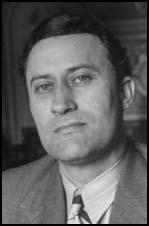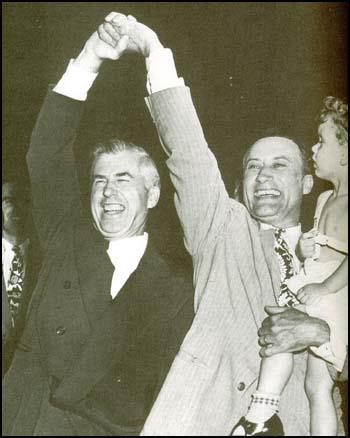Glen H. Taylor

Glen Hearst Taylor, the son of a preacher, was born on 12th April, 1904. The family settled in Kooskia, Idaho, and as a child he attended the local public schools.
Taylor left school with the desire to become an actor. In 1919 he joined a local theater company. He was also a country-western singer. Later he was the owner and manager of various entertainment enterprises.
Taylor was influenced by reading the works of Stuart Chase and King Camp Gillette. He developed left-wing views and in 1935 he unsuccessfully attempted to establish a Farmer-Labor Party in Nevada and Montana. Inspired by the success of President Franklin D. Roosevelt and the New Deal legislation he joined the Democratic Party.
Despite the fact he held socialist views, Taylor defeating incumbent David Worth Clark in the Democratic primary in Idaho in 1944 and Clarence Alfred Bottolfsen in the general election. In the Senate he aligned himself with Wayne Morse of Oregon and was a strong supporter of civil rights legislation and an opponent of Jim Crow laws.
In 1946 Taylor joined Henry A. Wallace to form the Progressive Citizens of America (PCA). Members included Rexford Tugwell, Paul Robeson, W.E.B. Du Bois, Arthur Miller, Dashiell Hammett, Hellen Keller, Thomas Mann, Aaron Copland, Claude Pepper, Eugene O'Neill, John Abt, Edna Ferber, Thornton Wilder, Carl Van Doren, Fredric March and Gene Kelly. A group of conservatives, including Henry Luce, Clare Booth Luce, Adolf Berle, Lawrence Spivak and Hans von Kaltenborn, sent a cable to Ernest Bevin, the British foreign secretary, that the PCA were only "a small minority of Communists, fellow-travelers and what we call here totalitarian liberals." Winston Churchill agreed and described Wallace and his followers as "crypto-Communists".
Henry A. Wallace decided to stand in the 1948 Presidential Election. He selected Taylor as his running-mate. Their chances were badly damaged when William Z. Foster, head of the American Communist Party, announced he would be supporting Wallace in the election. The New York Post reported: "Who asked Henry Wallace to run? The answer is in the record. The Communist Party through William Z. Foster and Eugene Dennis were the first... The record is clear. The call to Wallace came from the Communist Party and the only progressive organization admitting Communists to its membership."
The programme of Wallace and Taylor included new civil rights legislation that would give equal opportunities for black Americans in voting, employment and education, repeal of the Taft-Hartley Bill and increased spending on welfare, education, and public works. Their foreign policy program was based on opposition to the Truman Doctrine and the Marshall Plan.

Henry A. Wallace travelled to the Deep South and called for the end of the Jim Crow laws. He was attacked at every point he stopped and made a speech. One of his followers said: "You can call us black, or you can call us red, but you can't call us yellow." Wallace commented: "To me, fascism is no longer a second-hand experience. No, fascism has become an ugly reality - a reality which I have tasted it neither so fully nor so bitterly as millions of others. But I have tasted it."
Taylor also campaigned against racial discrimination. In Alabama he entered a public hall through an entrance marked "Colored". He pointed out in his autobiography, The Way It Was With Me (1979): "I was a United States senator, and by God, I wasn't going to slink down a dark alley to get to a back door for Bull Connor or any other bigoted son of a bitch. I'd go in any goddamned door I pleased, and I pleased to go in that door right there." Taylor was arrested and at a subsequent trial he was fined $50 and given a 180-day suspended sentence on charges of breach of peace, assault, and resisting arrest.
Harry S. Truman and his running mate, Alben W. Barkley, polled more than 24 million popular votes and 303 electoral votes. His Republican Party opponents, Thomas Dewey and Earl Warren, won 22 million popular votes and 189 electoral votes. Storm Thurmond ran third, with 1,169,032 popular and 39 electoral votes. Wallace and Taylor were last with 1,157,063 votes. Nationally he got only 2.38 per cent of the total vote. Only one supporter, Vito Marcantonio, won his seat in Congress.
Taylor's campaign in the 1948 Presidential Election earned him a reputation as an extreme left-winger and contributed to his defeat by David Worth Clark in the Democratic primary in Idaho. He returned to the business world and served as president of Coryell Construction Company. Taylor was forced to resign in 1952 after it was claimed that his left-wing past made him a "security risk" and was stopping the company gaining government contracts.
Taylor was forced to work as a manual worker on construction sites. He ran again for the Senate in 1954 but was beaten by Republican incumbent Henry Dworshak. In 1956 he narrowly lost the Democratic primary to Frank Church.
In 1958 Taylor and his wife, Dora, moved to Millbrae, California, and began making hairpieces by hand. Their company, Taylormade Hair Replacement. later become one of the major manufacturer of hair replacements in the United States.
Glen Hearst Taylor died on 28th April, 1984.
Primary Sources
(1) John C. Culver and John C. Hyde, American Dreamer: A Life of Henry A. Wallace (2001)
As Taylor prepared to enter the hall through an entrance marked "Colored," he was warned by police to use a rear entrance reserved for "Whites." Taylor was defiant. In his lively autobiography, Taylor recalled his thoughts: "I was a United States senator, and by God, I wasn't going to slink down a dark alley to get to a back door for Bull Connor or any other bigoted son of a bitch. I'd go in any goddamned door I pleased, and I pleased to go in that door right there."
In a flash he was shoved against the building by a burly policeman. Taylor came back swinging but several other policemen knocked him to the ground, tearing his suit on a strand of barbed wire and smashing his head on a concrete sidewalk. Soon the dazed senator found himself being driven slowly around town in a squad car while the police taunted him. "This is it - they're going to beat me to death," he said to himself.
Eventually Taylor was taken to the city jail and thrown into a stinking holding pen with the evening's catch of drunks, pimps, and pickpockets. One of his fellow prisoners approached and introduced himself. "They got me for puking on the sidewalk," he said. "What's your racket?" Taylor replied, "I am a United States senator, and they got me for trying to enter a meeting through a colored entrance." The man edged away in disbelief. "Obviously, he thought I was the craziest kook in the place," Taylor later wrote.
At length Taylor was photographed, fingerprinted, and released on bond. At a subsequent trial he was fined $50 and given a 180-day suspended sentence on charges of breach of peace, assault, and resisting arrest. The sentence was upheld by the Alabama supreme court; the U.S. Supreme Court declined to review the case. Taylor never paid the fine, and the matter ended quietly more than a year later when Governor James Folsom refused to ask for Taylor's extradition to Alabama.
After his release Taylor returned to the Capitol and recounted his astonishing experience in Birmingham on the Senate floor. "Not one senator opened his mouth," Taylor wrote. Not even Alabama's senators, Lister Hill (a former Wallace ally) and John Sparkman (later a Democratic vice-presidential candidate), said anything to apologize for their state's conduct.
The irony of the moment was neatly captured in a wire Taylor received from his running mate. "This dramatizes the hypocrisy of spending billions for arms in the name of defending freedom abroad, while freedom is trampled on here at home," Wallace said.
